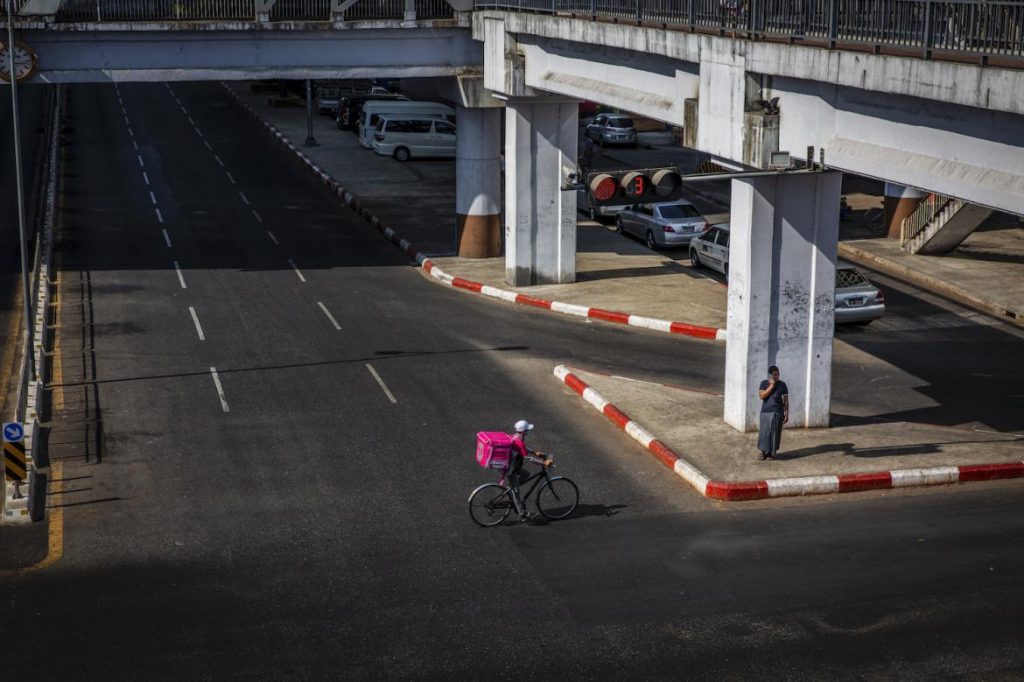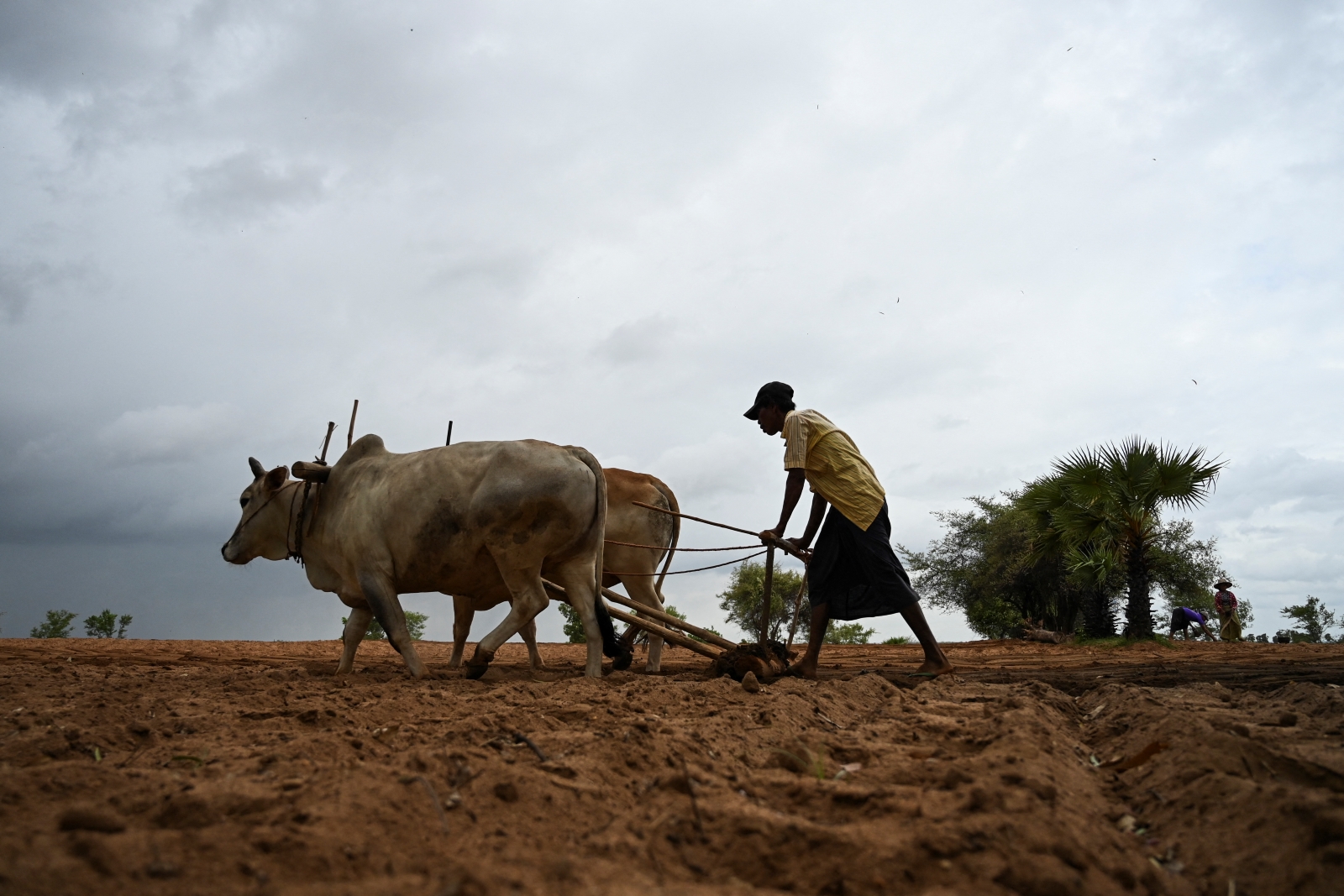The business community has welcomed interest rate cuts and other stimulus measures aimed at cushioning the impact of the coronavirus, but there’s consensus that more needs to be done to avert business closures and massive job losses.
By KYAW LIN HTOON | FRONTIER
Recent measures to stimulate the economy from the government and Central Bank of Myanmar have received praise from the business community. Fears remain though that they still won’t be enough to stop thousands of businesses from closing and potentially hundreds of thousands of vulnerable people losing their jobs.
The most recent measure was announced on March 24, when the Central Bank of Myanmar cut its interest rate by 1 percent, to 8.5pc. After leaving the rate unchanged for more than eight years, it has now made two cuts in a fortnight, leaving the deposit rate at 6.5pc and the collateralised lending rate 11.5pc.
The business community has praised the cuts for making it cheaper to take out loans at a time when the economy is in decline because of the coronavirus pandemic.
Interest cuts are only one of the measures in the government’s arsenal for tackling the downturn in the economy.
Support independent journalism in Myanmar. Sign up to be a Frontier member.
Since 18 March, the government has also unveiled an initial stimulus package that includes a K100 billion (about US$70 million) loan fund, and has eased deadlines for tax payments and granted tax exemptions for Myanmar-owned businesses that have been badly affected by the global pandemic.
While broadly welcoming the stimulus measures taken by the government, economists and other specialists say they do not go far enough to counter the impact of the downturn, which has barely begun.
“Cutting the interest rate is a good move but businesspeople have to borrow to cover their liabilities, which include the salaries of employees. It’s quite different in other countries where governments are helping businesses to pay their employees rather than letting businesses fail,” said Dr Soe Tun, a prominent businessman and executive committee member of the nation’s peak business body, the Union of Myanmar Federation of Chambers of Commerce and Industry.
The government’s stimulus fund was established with K50 billion from its revolving fund and K50 billion from the Social Security Fund, which is made of monthly contributions from workers and employers in the formal sector.
Soe Tun said he has reservations about dipping into the Social Security Fund to help businesses. “Contributions to the social welfare fund are paid by businesses and employees and I don’t think it should be made available to businesspeople as loans instead of using it as intended for the social welfare of people throughout the country,” he told Frontier.
The K100 billion loan fund is intended to ease the effects of the pandemic on the garment and hotels and tourism sectors as well as Myanmar-owned small and medium-sized enterprises. The loans will incur interest of only 1pc with an initial term of one year, although this could change depending on how the situation evolves.
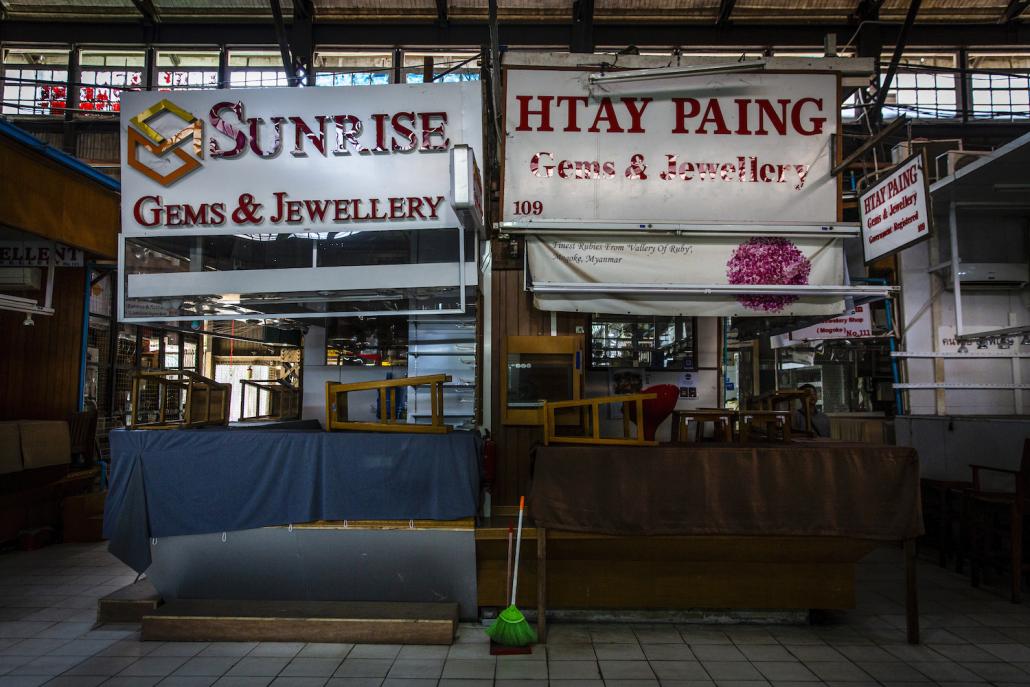
Shuttered gems and jewellery stores in Yangon’s iconic Bogyoke Market. Businesses linked to the tourism industry have been hard-hit by the COVID-19 global pandemic. (Hkun Lat | Frontier)
Short-term stimulus needed
Many economists are concerned that the government does not seem to have a short-term plan for addressing the situation. They are also worried about the lack of a clear strategy for helping low-income households who have been directly or indirectly affected by the pandemic, from families reliant on migrant worker remittances to plantation labourers whose employers have fled the country. There’s also concern that the measures taken so far will not be enough to help businesses and workers in need, whether in the formal or informal sectors.
Fitch Solutions, a country risk and industry research firm, said in a note on March 25 that while the measures might help to “soften the blow for businesses” it did not expect them to provide much of a near-term boost. It also cautioned that the soft loans would likely benefit larger local businesses because SMEs, while making up 90pc of all registered business, have traditionally struggled to access financing.
Fitch’s prognosis for the economy was bleak, prompting it to slash its growth forecast almost in half, from 6.3pc to 3.6pc. Reduced incomes and loss of employment would put downward pressure on private consumption, while foreign investment is likely to slow as businesses delay their investment amid an impending global recession. Exports, particularly garments and natural gas, are expected contract this fiscal year and will only be partially offset by lower imports.
One Yangon-based business consultant said that while foreign businesses are continuing operations in Myanmar, many expatriate staff have been withdrawn and generally attention is being focused on responding to COVID-19. “There’s limited capacity for new initiatives or pushing through projects at the moment,” he said. “My guess is there will be something of a slump in new investment for a few months due to this.”
U Win Htike, deputy permanent secretary at the Ministry of Planning, Finance and Industry, said the task force managing the COVID-19 fund is led by the Ministry of Investment and Foreign Economic Relations and is headed by its permanent secretary, U Aung Naing Oo.
“The task force is drafting the details of its operating procedures and [loan] criteria and after it has finished, it will begin accepting and assessing applications for loans of one year with a 1pc interest rate,” Win Htike told Frontier.
Although he could not say when the task force will begin its work, the Ministry of Planning, Finance and Industry with its 25 departments was striving to begin processing applications as soon as possible.
“We have already eased taxes, too,” Win Htike said. “The payment of taxes on exports, income and commercial activities has been postponed to the end of the year, rather than having to be made every two or three months.”
However, Soe Tun said that in many COVID-19 affected economies, taxes were being waived or reduced rather than delayed.
“In our country they have only postponed the payment of taxes, so the question is, what if the business can’t afford to pay [the postponed taxes] later?” he said. “So, overall, the support and solutions for helping the economy are still weak in our country if compared with others.”
The gravity of the situation is recognised by many in the banking sector, some of whom likened the pandemic to a war rather than an economic crisis.
“We are fighting a war against this virus and every sector has been affected,” said U Pe Myint, an adviser and former director at CB Bank, who was hopeful about the possibility of a recovery within three months.
Meanwhile, U Win Zaw, chief policy officer at the Construction and Housing Development Bank, said it was holding urgent meetings to consider ways of helping people and businesses.
He praised the CBM for cutting its interest rate to 8.5pc and said all bankers were considering how they could best respond to the situation.
“However, I don’t dare guess when businesses will recover because it is directly related to the evolution of the pandemic,” Win Zaw said.
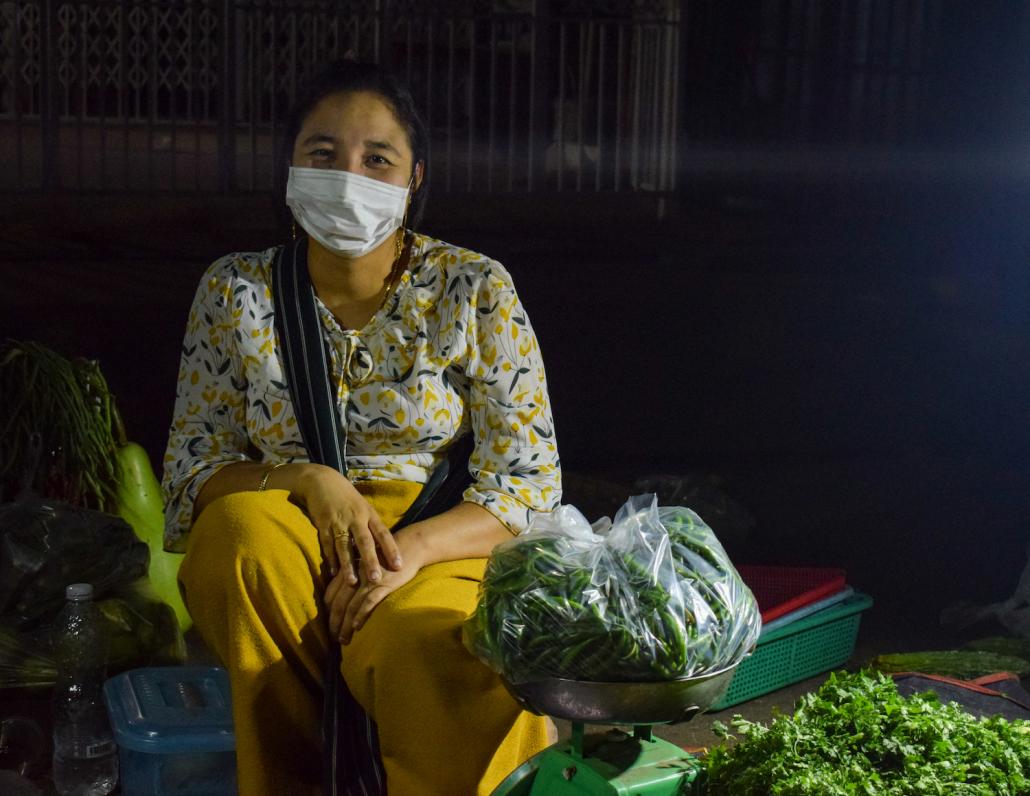
A vendor at the Thingangyun night market on March 26. Workers in the informal sector have little safety net, in part because they do not contribute to the Social Security Fund. (Kyaw Lin Htoon | Frontier)
U Than Lwin, a senior adviser at KBZ Bank, also said the banking sector was doing what it could to help businesses, but was critical of the response to the crisis from the government and the CBM.
Than Lwin said other countries had resorted to much larger stimulus measures.
“The CBM and the government can also use tools like quantitative easing for dealing with what is a real crisis situation,” he said.
He suggested that the CBM could print money for the government to use on labour-intensive infrastructure projects that would put money directly into the hands of businesses and workers.
“In this situation, we don’t need to be worried about inflation but we do need to worry about deflation,” he told Frontier.
Protecting workers
Thousands have already lost employment as a result of coronavirus. The garment sector was hit weeks before the first cases were confirmed in Myanmar, with factories forced to close because of disrupted raw materials supply chains and lower demand from Europe. Many factories have remained open but reduced working hours, cutting back on overtime that can contribute one-third of an employee’s income.
There are also concerns for the health of workers in the sector. As a precaution against the spread of the coronavirus, an increasing number of businesses are allowing employees to work at home, but remote work is not possible in garment factories, where social distancing is also difficult to implement.
On March 25, government officials, business owners and labour representatives met to discuss health risks for garment workers, with the Confederation of Trade Unions in Myanmar proposing that all factories close from April 1 to 30, with workers to receive 40pc of their usual salary. Other options discussed reducing the workforce by letting half take leave in the first 15 days of the month, and the other half in the final 15 days. Despite lengthy discussions, the meeting ended without any agreement.
“We are demanding that the government and employers grant workers home leave, which should be voluntary as it is in other countries,” Ma Khaing Zar, a CTUM executive committee member, told Frontier prior to the meeting. She said the government should consider paying part of the workers’ salaries if factories were unable to do so.
Khaing Zar, who is also president of the Industrial Workers Federation of Myanmar, said a cautious approach was needed in part because “massive” numbers of migrant workers have returned from Thailand, and some are staying in the Hlaing Tharyar industrial zone. “If any of those returnees have the coronavirus, it could easily spread to workers,” she said.
Many are worried about the impact of the pandemic on the informal sector, where workers have no social safety net because they do not contribute to the Social Security Fund.
U Aung Zaw, 48, is a self-employed tour guide in Tanintharyi Region who also sells seafood at the Htee Khee border crossing with Thailand.
“The border gate has been closed for six days now and there have been no visitors, so I can’t do tours and there are no buyers for the seafood,” he told Frontier on March 24.
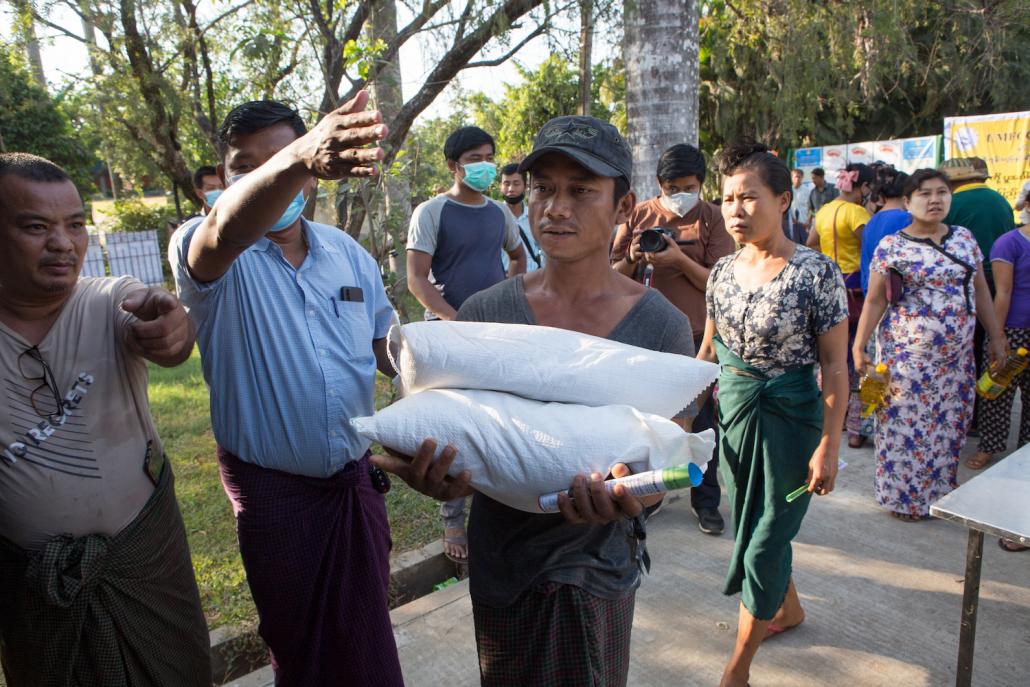
Industry associations organised an event in Hlaing Tharyar on March 26 to sell rice, oil and other basic commodities to residents at reduced prices. (Thuya Zaw | Frontier)
The closure of borders in response to the coronavirus is likely to create considerable hardship for those who rely on the informal economy to make a living.
One of the worst affected sectors is tourism, which has crashed as airlines have suspended services because of the pandemic.
U Hla Htay, chair of the Yangon-based Flying Swallow Transport Association, a collective of 150 drivers and car owners whose services include providing trips around the commercial capital and to Bago, said business was bad.
“Most of our members are facing shortages of passengers and since our incomes depend on them, we are all suffering terribly,” he told Frontier.
Hla Htay said he was aware of the government’s stimulus measures, but doubted they would help Flying Swallow’s members because it is an association rather than a business.
“I think it couldn’t directly help us,” he said. “Unless we get help soon, all of our members – and their families – will be in crisis sooner or later.”
The association has been active in providing voluntary services and other support during natural disasters, such as floods.
“We were volunteering and providing donations for victims of the 2015 floods, but now we are victims and I hope that big businesses or the government will consider helping us,” Hla Htay said.
In an effort to support workers, a group of business organisations – including the UMFCCI, the Hlaing Tharyar Industrial Zone Management Committee, and industry bodies from the rice and edible oil sectors – arranged to sell basic consumer goods, especially rice and oil, at a reduced price to Hlaing Tharyar residents on the evening of March 26.
The UMFCCI said it arranged the sale so that people in the industrial zone don’t face shortages of essential goods or have to pay unreasonable prices. Although large numbers of people took advantage of opportunity to buy basics at below-average prices, the business body has not announced whether it plans to hold the events on a regular basis.
Soe Tun urged the government to take stronger measures to look after low-income households, particularly those who rely on income from the informal sector.
Referring to a US$2.2 trillion rescue package approved by the United States Senate that provides for up to $1,200 in direct relief for American citizens, he said: “Even if the government can’t pay people like [US President Donald] Trump paid his people, it would be really helpful if the government could give them, for example, a pack of rice and five bottles of edible oil.”


